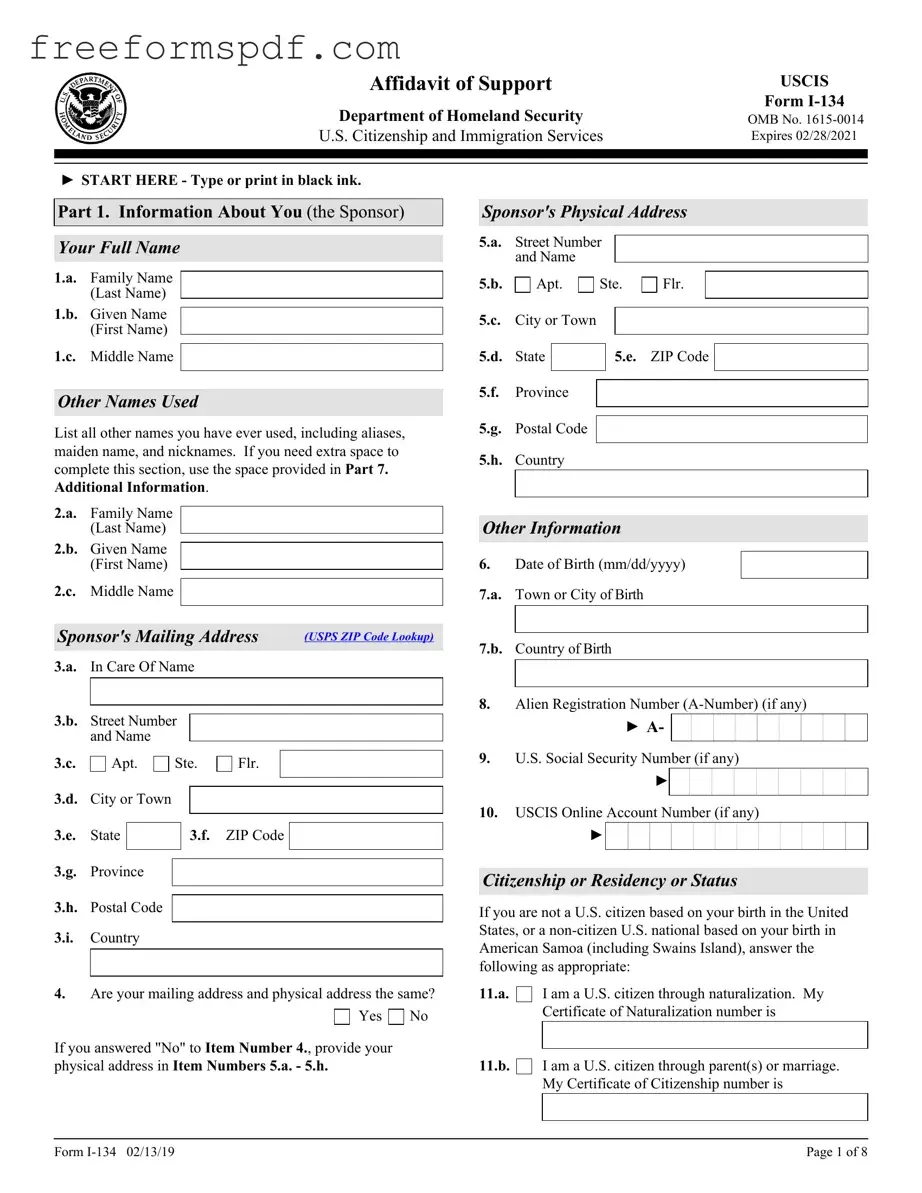Fill in a Valid USCIS I-134 Template
Common mistakes
-
Incomplete Information: Many applicants fail to fill out all required fields. Leaving sections blank can lead to delays or even denials. It is crucial to review the form thoroughly to ensure every question is answered.
-
Incorrect Financial Information: Providing inaccurate details about income or assets can create significant issues. Make sure to include the correct amounts and verify that they align with supporting documents.
-
Missing Supporting Documents: Applicants often forget to attach necessary documentation, such as tax returns or bank statements. These documents are essential for verifying the information provided on the form.
-
Failure to Sign the Form: It may seem simple, but some individuals overlook signing the I-134. A missing signature renders the application invalid, so double-check that all required signatures are present.
-
Using Outdated Versions: Submitting an outdated version of the form can lead to rejection. Always ensure you are using the most current form available on the USCIS website.
-
Inconsistent Information: Providing conflicting information between different sections of the form or with other documents can raise red flags. Consistency is key; review everything carefully before submission.
-
Not Following Instructions: Each form comes with specific instructions. Ignoring these can lead to mistakes. Read the guidelines carefully and adhere to them to avoid unnecessary complications.
Learn More on This Form
-
What is the USCIS I-134 form?
The USCIS I-134 form, also known as the Affidavit of Support, is a document used to demonstrate that a visa applicant has adequate financial support during their stay in the United States. It is often required for non-immigrant visa applicants, such as those applying for tourist or student visas.
-
Who needs to file the I-134 form?
The I-134 form is typically filed by a U.S. citizen or lawful permanent resident who is sponsoring a foreign national. This sponsor must show that they can financially support the applicant, ensuring that the applicant will not become a public charge.
-
What information is required on the I-134 form?
The form requires detailed information about the sponsor's financial situation, including income, assets, and liabilities. The sponsor must also provide personal information, such as their name, address, and immigration status. Additionally, supporting documents, like tax returns and pay stubs, may need to be submitted.
-
How does the I-134 form affect the visa application process?
The I-134 form plays a crucial role in the visa application process. It helps consular officers determine whether the applicant has sufficient financial backing. A strong I-134 can improve the chances of visa approval, while a weak or incomplete form may lead to denial.
-
Is there a fee to file the I-134 form?
There is no filing fee associated with the I-134 form itself. However, the sponsor may incur costs when gathering supporting documents or seeking legal assistance. It's essential to ensure all required information is accurate and complete to avoid additional delays.
-
Can the I-134 form be filed online?
As of now, the I-134 form must be submitted in paper form. The sponsor should fill it out completely and mail it to the appropriate address as specified by USCIS or the U.S. consulate handling the visa application.
-
How long is the I-134 form valid?
The I-134 form does not have a specific expiration date. However, it is generally valid for the duration of the visa application process. If circumstances change significantly, such as a change in financial situation, the sponsor should update the form and submit a new one.
-
What should I do if my I-134 form is denied?
If the I-134 form is denied, the sponsor should carefully review the reasons for the denial. They may need to provide additional documentation or correct any inaccuracies. Consulting with an immigration attorney can help clarify the next steps and improve the chances of a successful application in the future.
Misconceptions
The USCIS I-134 form, also known as the Affidavit of Support, is often misunderstood. Here are four common misconceptions about this form:
-
Misconception 1: The I-134 form guarantees visa approval.
This is not true. While the I-134 form is an important document that demonstrates financial support, it does not guarantee that a visa application will be approved. The decision ultimately rests with the immigration officer reviewing the application.
-
Misconception 2: Only U.S. citizens can file the I-134 form.
This misconception is misleading. Lawful permanent residents can also submit the I-134 form to support a visa applicant. However, it is essential that the sponsor has adequate income and resources to support the applicant.
-
Misconception 3: The I-134 form is the same as the I-864 form.
This is incorrect. The I-134 form is used for non-immigrant visa applicants, while the I-864 form is for immigrant visa applicants. Each form serves a different purpose in the immigration process.
-
Misconception 4: Submitting the I-134 form means the sponsor is financially responsible for the applicant.
This is a common misunderstanding. While the I-134 form shows that the sponsor is willing to provide financial support, it does not create a legally binding obligation for the sponsor to support the applicant in the same way that the I-864 does.
Browse More Forms
Bdsm Checklist - Explore the possibility of mentorship in BDSM communities.
Filling out the NYCERS F552 form is a vital step for retirees seeking to ensure their financial well-being, and resources like NY Templates provide valuable assistance in understanding the intricacies involved in making informed decisions about pension payment options.
Texas Temporary Tag - This form is a practical solution for those in need of immediate driving permits for their vehicles.
